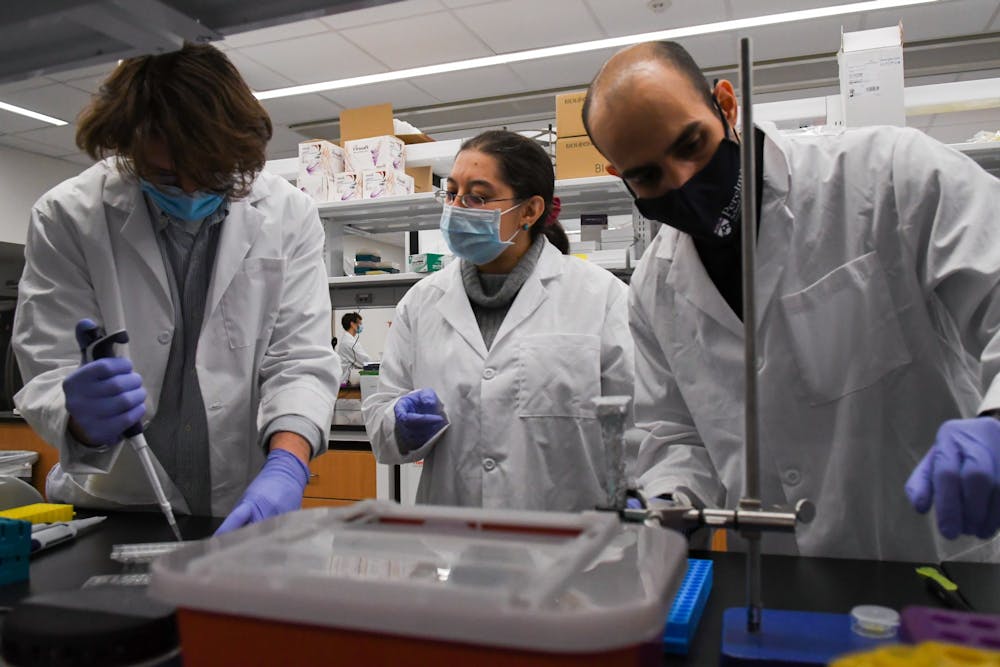
Researchers Tyler Papp, Hamideh Parhiz, and Amir Yadegari (from left to right) in the Weissman Lab on Jan. 22.
Credit: Sukhmani KaurAs research operations transition to Phase III of the University's phased plan for research, Penn Medicine researchers and undergraduate students are excited to return to an in-person setting.
In accordance with Penn's guidelines, masks are required inside labs and physical distancing is recommended. Research personnel may also work remotely if desired. Senior Vice Provost Dawn Bonnell had announced the final transition to full research operations on Aug. 5 a year and a half after Penn's campus and its research labs closed due to the COVID-19 outbreak.
In interviews with The Daily Pennsylvanian, Penn Med professors and undergraduate students reflected on how they navigated lab work during the pandemic and how they feel about returning to in-person research.
Challenges of the Pandemic
At the onset of the pandemic, Yunji Seo, a research technician in Penn's Alice Chen-Plotkin lab and 2021 Roy and Diana Vagelos Scholars Program graduate, left the United States to return back to South Korea where her family lives. This forced her to abandon her original lab duties at the bench, which involved measuring protein levels in biological samples and cell immunofluorescence wherein she began working remotely on a computational analysis project.
“I learned to do computational analysis which I wouldn't have thought of doing if I could do benchwork in the lab,” Seo said. During her time in Korea, Seo said she worked on many dataset-heavy projects that involved the processing of details such as demographics, genetic mutations, and clinical information. The data Seo generated is now under review for publication, she said.
For John Detre, a professor of neurology and radiology who researches physiological brain imaging, the pandemic restrictions have stalled one of his projects by one year. The project's goal was to validate biomarkers for "small vessel ischemic disease of the brain, which is the second leading cause of dementia."
"The team was separated and we had to learn to work using remote tools, and for about six months, we were really unable to acquire any new data,” Detre said, referring to his work with MRI and optical methods. He noted that his lab faced challenges during the pandemic, such as difficulty recruiting people and accomplishing certain administrative tasks.
Like Detre, College junior Mehek Dedhia works as a research assistant in the Issac H. Chen lab and is in the Penn Program on Precision Medicine for the Brain. Originally doing benchwork such as handling biological samples, her freshman year, Dedhia was forced to explore computer-based lab research with the onset of the pandemic.
“There was no way for me to contribute remotely, so that’s when I looked for research opportunities that were more data analytics-[related],” Dedhia said.
Similar to Dedhia, College junior Hiba Hamid was unable to continue her work with the John A. Wolf Lab when the pandemic hit. She previously conducted behavioral tests on rats with traumatic brain injuries.
With the help of Dr. Alexandra Ulyanova, a research associate in the Wolf lab, Hamid said she was able to switch to a remote project where she analyzed videos of pigs that had TBIs. Hamid said she is grateful to the postdocs and professors that continued to mentor undergraduate students remotely throughout the pandemic.
“They prioritized a lot of undergrads and a lot of my other friends also did remote research, and the fact that we were all able to still do something even in the face of a pandemic is incredible,” she said.
Benefits of the Pandemic
In order to navigate around the limitations posed by the pandemic, Penn Med researchers worked on the the development of new technologies. Detre and his colleagues, for example, created a remote control for the MRI machines. The control allows a student's supervisor to log onto the scanner and resolve the issue when a student runs into an obstacle during an experiment.
Detre said the remote control will allow future undergraduate research assistants to continue to work even if some faculty are not in the lab. New guidelines have been implemented within labs so that research personnel can sometimes work remotely if desired.
Students also said the pandemic led them to develop new avenues of research interest.
Seo, for example, described how the transition to remote research led her to explore a new direction with a computational analysis project.
“These statistical analyses can lead to benchwork projects. For example, if some analysis shows that a protein may have an impact in Parkinson's Disease, then we can actually come back to the lab, after this whole fiasco, and we can do some more benchwork that is relevant to that protein,” Seo said.
Some researchers, like Detre, saw the pandemic period as a learning experience.
“This was the big event, I think, for many of our lives where something outside of our control actually altered how we function on a day to day basis in our families and work,” Detre said. "I think these kinds of disruptive things serve a useful purpose to reflect and try to come up with better ways of approaching everything.”
In accordance with Penn's guidelines, masks are required inside labs, with physical distancing recommended. Lab meetings in the Detre and Chen-Plotkin lab, and for Dedhia and Hamid continue to be virtual as well.
Seo said the remote experience ultimately helped her realize her passion for doing research in person.
“COVID-19 actually made me realize how much I love in-person research, and so I think it actually solidified my plans on doing research as a career,” Seo said.
The Daily Pennsylvanian is an independent, student-run newspaper. Please consider making a donation to support the coverage that shapes the University. Your generosity ensures a future of strong journalism at Penn.
Donate







